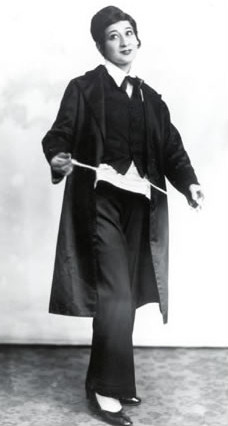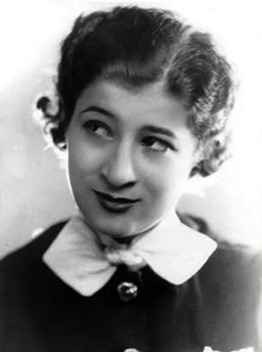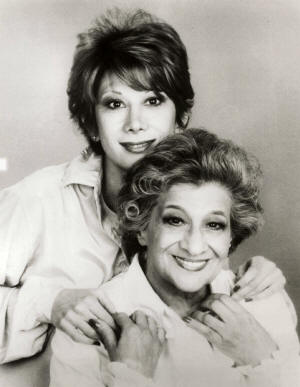|
When asked when she started
on Second Avenue, she doesn't hesitate, "When they let
me!" She was Second Avenue's Fraydele, "The Little
Queen," "The Golden Girl," a large voice in a small
body.
She fit perfectly into a
favorite plot device: The Yeshiva boy who the audience
discovers when it's time for the last act show stopper,
is really a girl .... all this time before Streisand
dreamed of Yentl. She was able to bring to the theatre
the sound of the synagogue where it was a great novelty,
and she was easily accepted, cleverly interspersed into
shows written specifically for her vocal and comedic
talents.
|

|
|
When Fraydele
was a teen, the family settled in
Philadelphia, and she found work in a
pretzel factory, getting paid for every
pretzel that didn't break. "Hating" the job,
she begged her older brother Moishe to take
her to New York.
She was an
olive-skinned gangly kid who made her way on
her own without the help of her immigrant
parents. As a teenager, she was often
rejected by her father for not having been
born male, but she would eventually catch
his attention when she was accidentally
heard singing to herself one day.
Recognizing her gift, grandpa Selig Oysher
promptly began tutoring her in cantorial
repertoire, and he then sent her out to
"make a dollar," If you had asked her how it
all came about, she probably would have
said, "I had to make a living.
When Papa
heard me singing to myself one day by
accident, he sent me to work right
away."
Quickly, she
caught the attention of audiences with her
great "pipes," charisma, and guts. Her rise
was meteoric and she became a star well
before her brother, the legendary
cantor/actor, Moishe Oysher.
She also was
offered opportunities to sing as a female
cantor in the synagogue, but times being
what they were, she opted to remain on the
stage. She didn't think of or refer to
herself as a pioneer of feminism. However,
long before the Jewish Reform movement came
into being and women were embraced as rabbis
and cantors in synagogues throughout the
world, Fraydele Oysher was the woman who
played the major role in paving this new
road for women. |
|
photo:
Fraydele Oysher in one of her roles, as a
Yeshiva boy. |
Fraydele's vocal and
interpretive mastery of such diverse music as liturgical
chants, theatre songs, and folk songs make the listener
feel that they are hearing the piece for the first time.
Here, from the album,
"Yiddish Soul," you will be moved as you listen to Fraydele sing the cantorial, "Habeit Mishomayim (Look
Down From the Heavens)":
|
In 1935,
Fraydele married Harold Sternberg, a basso
profundo opera singer of the famed Metropolitan
Opera House. The following year she traveled with her husband,
who acted
as her leading man, to South America for
their honeymoon, concertizing and playing
her signature shows from Canada to Cuba. She
was billed simply as "Fraydele." He also had
appeared on Broadway in a number of George
Gershwin shows, such as "Pardon my English"
(1933), "Let Them Eat Cake" (1934); also
"The Eternal Road" (1937).
Fraydele's
biggest hits on the Yiddish stage had her
masquerading as a boy who could officiate at
the bimah, who in the last act would be revealed as
being a
sexy vibrant lady. Imagine this, the Yeshiva
bucher, (boy student) played by Fraydele, revealing
that she is pregnant in the last scene, and actually going into labor, as the Rabbi
cries out to the congregation. "Gevalt
yidn,
der chazn gait tzu kint!" Translation; "Oh
boy, the cantor is giving birth!"
The audiences
went wild, especially when such shenanigans
were racy in those days, and inhabited by a
magnificent cello of a voice, a natural
comedic gift and a vocal range that touched
hearts. She was the pioneer of liturgical
music way before a woman ever dreamed of
singing it. And in that respect, a feminist
before the word was coined. |
|
 |
The first song Fraydele ever
sung in public was Sholom Secunda's "A mame iz di beste
fraynd (A Mother is the Best Friend)."
Fraydele's personality was
part Jewish mother, part Mama Rose, with a generous
sprinkling of Dorothy Parker.
In the 1930s, she also
performed on radio programs, on the Philadelphia
stations WLTH, WEVD, WMCA WCAU, WFAN, WREX, where they
each paid her five dollars for each fifty-minute
segment.
Fraydele performed
extensively throughout the United States, Canada, South
America and Cuba. Some of the theatres she performed in
were. in the United States: the Douglas Park and Civic Theatres
in Chicago, Illinois; the Erlanger Theatre in
Buffalo, New York; the Amphion, Tilyou, Lyric, 46th
Street and Parkway Theatres (all in Brooklyn, New York)
;Town Hall, David Kessler's Second Avenue Theatre, the
Clinton Theatre, the Yiddish Anderson Theatre, Avery
Fisher Hall of Lincoln Center, all in Manhattan,
New York City; the Garden State Arts Center in New
Jersey, the Town Hall, Northeast Bronx Cultural Center,
the Bronx Art and Windsor Theatre (Bronx); the
Philadelphia Yiddish Art Theatre; in Massachusetts, John
Hancock Hall in Boston, and the Shawmut Theatre
(Roxbury); the Plaza and Cameo Theatre, in Miami Beach; and the
Civic Playhouse in Los Angeles, California. In Canada,
she has performed at the Monument National and Brebeuf
Theatres, in Montreal; Masses Hall, in Toronto; and in
the Playhouse Theatre in Winnipeg.
Many plays were written for
Fraydele's special vocal and comedic gifts. The
following is a partial list. "The Cantoress," by Louis
Freiman, music by Joseph Rumshinsky; "Fraydele's
Wedding"; "The Sacrifice of Isaac" by Avram
Goldfaden, "The Little Queen," "The Cantor's
Daughter"; William Siegel's "Golden Girl"; Avraham Blum's "Fraydele is Not a Girl,"
"A Cantor on the Sabbath"; "A Night in Paris!," an operetta in three acts
by Isidore Lash, music by Alexander Olshanetsky.
Some of the other plays
Fraydele acted in were: In January 1949 at the Clinton
Theatre in New York City, Philip Laskovsky's operetta,
"Her Father's Melody," also starring Vera Rosanka and
Israel Rosenberg. In May 1951, she performed along with
"seventy-five players and singers," in a testimonial to
actor and director
Israel Rosenberg, and manager of the Downtown National
Theatre Oscar Green, marking their twenty-fifth
anniversary with the theatre. In January 1953, Jacob
Jacob's comedy, "Her Father's Bride," at Brooklyn's
Parkway Theatre, which also starred Jacob Buloff and
Aaron Lebedeff; March 1954, and "My Grandfather's
Melody" at the Downtown National Theatre, with Henrietta
Jacobson (co-starring Esta Salzman, Celia Boodkin and
Morris Tarlowski).
|

|
|
One of her later stage
appearances was on 19 October 1968, when there was
staged at the Yiddish Anderson Theatre in New York City, the
Yiddish musical "It's Never Too Late for Happiness" [book by Kalman Lipson, lyrics
and adapted by Joseph Jacobs, music by Samuel Fershko, starring Fraydele,
Bruce Adler, Max Perlman, Jacob Jacobs, Seymour
Rechtzeit and Miriam Kressyn,
Jacob Zanger, Leon Liebgold, Gita Galina, Thelma Mintz,
and Diana Cypkin]. New York Times critic Richard F.
Shepherd considered Fraydele "a welcome sight."
A great wit, she nurtured a proverbial family of
entertainers -- her daughter, the singer and comedienne,
Marilyn Michaels; her son Michael Sternberg (a singer,
musician and composer), and her grandson, Mark Wilk (a
writer, pianist and singer).
Fraydele eventually turned down offers to travel abroad when
motherhood called, and even though she performed well
into her seventies, doing commercials and concerts, she
was in fact the mom who was the major force behind her
daughter, Marilyn Michaels' career.
Fraydele passed away on 5
January 2004 in New York, New York.
|
From the album "Songs my
Brother Moishe Sang," listen to Fraydele sing "Bam rebbins tish (At the Rebbe's Door)" with her daughter
Marilyn.
Sh. E.
from her daughter Marilyn Michaels.
-
Marilyn Michaels --
website,
www.marilynmichaels.com .
-
The Cantors Assembly
-- Journal of Synagogue Music, Vol. 32, 2007, pp.
72-77.
|